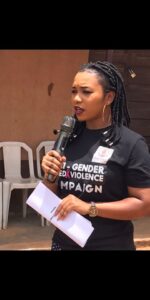(Life & Living) I desire to create a cycle of self-motivated female change-makers – Gladys Emmanuel, lawyer and gender advocate
Human Rights Lawyer and Gender Advocate, Gladys Emmanuel is focused on women’s and girls’ rights, domestic violence, and gender equality. Committed to eliminating domestic violence, she spoke to The Nigerian Xpress about her efforts towards promoting the rights of women and girls, gender development and supporting prospective young female lawyers.
As a human rights lawyer, what are you doing practically to advance the rights of Nigerians and what would you do differently if you have a better platform/portfolio in Nigeria?
Recent engagements with individuals in the country have demonstrated that some individuals have experienced diverse forms of human rights violations without possessing the requisite information on how to access justice.
As a human rights lawyer in Nigeria, I leverage all necessary virtual and physical platforms to provide information to members of the public on the existence of human rights and the appropriate mediums to approach should their rights be violated. In addition, I provide legal support for indigent persons (women and children) through legal representation in court to ensure access to justice.

At periodic intervals, the outcome of these support units would be documented and shared with the various human rights agencies in the country who would in turn present a report to members of the public through town hall meetings. Unfortunately, this vision is not realisable at the moment owing to the state of insecurity in the country, and the prevalence of religious doctrines and harmful cultural practices which support human rights violations.
How can you assess the protection and enforcement of human rights in Nigeria? What is the way forward?
The early 19th century has been characterised by a surge in human rights advocacy, as various countries across the globe have developed diverse strategies to ensure the advancement and protection of human rights. Unfortunately, the narrative is different in this part of the world as many are unaware of the rights enshrined in the 1999 Constitution of the Federal Republic of Nigeria (as amended).

At the moment we have various non-governmental organisations striving to ensure a change in the narrative but overall, the human rights arena in the country is a work in progress. In changing the existing status quo there is a need to undertake intensive training for our law enforcement officers on human rights borrowing from international best practices.
Also, it is very important to fund agencies/organisations charged with the protection of human rights to encourage ease of dispensing their duties. As mentioned earlier, the importance of awareness creation amongst citizens cannot be over-emphasized. I equally advocate for the strengthening of our domestic legislation, and the domestication of various international human rights instruments in the country as this would provide for effective protection and enforcement of human rights.
As a gender advocate, what policies would you like to see enacted at both federal and state levels to protect the rights of special persons, not women and girl child alone?
The United Nations Convention for the Rights of Persons with Disability (UNCRPD) would be the first, and the rationale for this is simple. The UNCRPD has created a shift in the way the discourse on disability is being approached. It provides a human-rights-based approach that replaces the charity approach that views persons with disability as individuals to be pitied, who are not entitled to basic rights under the law.
As forward-thinking as this law is, some states in the federation are yet to domesticate it. The Convention for the Elimination of all Forms of Discrimination against Women (CEDAW) is another international instrument that is capable of transforming the approach to women’s rights in the country through the promotion of equal rights for women and girls.
With the rejection of five women-related bills by the National Assembly and all the brouhaha that followed, would you attribute the rejection to misogynistic inclinations/tendencies? How do we make Nigeria follow countries such as South Africa, Niger, South Sudan, and others who have given their women due/deserved places in line with international provisions?
The rejection of the bills that addressed citizenship issues, indigeneship, affirmative action, gender equality and seats in parliament demonstrate how backward we are as a nation in recognising women as individuals entitled to all legal rights like the male.

Also, abolishing customs and doctrines that view the woman as second class is vital.
Domestic violence and gender inequality are still rearing their ugly heads in different quarters, though efforts have been made by different persons to arrest the situation, what do you have in mind to do differently at any given little opportunity –all efforts geared towards advancing women and girls’ rights?
I believe that laws play a pivotal role in addressing issues of domestic violence and gender inequality. I would continually lend my voice through advocacy for the implementation of the Violence against Persons Prohibition (VAPP) Act 2015, and the domestication of the Convention for the Elimination of all Forms of Discrimination against Women (CEDAW).
READ ALSO: http://Aviation Fuel Crisis: Passengers alerted on flight disruptions
Practically what has Tabitha Empowerment Centre done to eliminate domestic violence and advance the rights of women? What do you still want to do better?
As an organisation, Tabitha Empowerment Centre (TEC) has kicked-off diverse projects to eliminate domestic violence and advance the rights of women. Most notable amongst them are:
-Anti-gender-based violence campaign: This project targets communities within Abuja through organising anti-gender-based violence sensitisation and liaising with government agencies, traditional gatekeepers, and international organisations to foster commitment on the part of key stakeholders to eliminate this menace.
In addition, TEC equally established anti-gender-based violence support units in the supported communities to encourage speedy and easy intervention.
– Anti-gender-based violence school drive: This project is targeted at disseminating preventive messages on gender-based violence to schools within Abuja. To ensure continuity of the project’s impact, the organisation establishes a school club to encourage students to speak out against all forms of gender-based violence.
– Training of anti-gender-based violence community champions: TEC has continually trained individuals from various communities in Abuja, to enable them to acquire sufficient knowledge to tackle issues of gender-based violence in their respective communities. The organisation has equally embarked on various media drives to ensure members of the public get acquainted with information on domestic/gender-based violence. TEC also makes frantic efforts to safeguard the welfare of survivors through the provision of psychosocial support/rehabilitation.
You wrote a paper, “The Problem in Supporting Trafficked Children in the UK. How can systems be improved to address this? What has changed so far?
A recent report published by the Office for National Statistics in the United Kingdom (UK) has hinted that the discreet nature of trafficking (modern slavery) makes it difficult to ascertain the number of victims in the country. Notwithstanding this challenge, efforts have been made and strategies emplaced to reduce the number of children trafficked en route to the UK. From 2016-2021, the authorities in the UK have completed about 185 cases of child trafficking, with a conviction rate of about 51 per cent. Also, the National Referral Mechanism (NRM) has witnessed tremendous progress with the number of trafficked children being increased by 9 per cent. This is a huge achievement for the NRM against its previous accomplishments.
As a member of The United Nations, give us a sense of how Nigeria has respected the UN Convention on the Rights of Persons with Disability?
In 2007, Nigeria ratified the Convention for the Rights of Persons with Disability (CRPD) and its optional protocol in 2010. From that moment to date, persons with disabilities, and civil societies have continually called on the government to fulfil the obligations conferred on Nigeria as a state party to the CRPD. In 2018, Nigeria made some progress by passing into law the Discrimination Against Persons with Disabilities (Prohibition) Act, which prohibits discrimination on grounds of disability. The law equally provides for sanctions in the form of fines and prison sentences on persons who contravene it. This development is by the provisions of the CRPD.
What do you want to see in the long run in the girl child as you offer mentorship programmes to young girls and women?
Growing up in a patriarchal society exposes the female to various forms of marginalisation concerning accessing education, resources, and finances. This is because she is viewed as embodying the role of a carer and any attempt for her to aim for better opportunities is met with strict resistance and extreme criticism by society.
It is, therefore, my desire to create a sense of value amongst the females, an awareness of the enormous potential possessed by the female, and equally change the existing mindsets that society has construed over time about the female gender. This would in turn create a cycle of females that are self-motivated and change makers.
What makes your virtual human rights mentorship programme unique and worth banking on?
The human rights mentorship with Gladys Emmanuel Esq. is a virtual platform that was launched in 2021, for the sole purpose of providing an in-depth appreciation of human rights. This mentorship does not view the discourse of human rights strictly from the legal perspective. It considers human rights from an interdisciplinary standpoint. Through this program, the selected participants are coached by academics, policy strategists, activists, lawyers, medical personnel, and clergy from various parts of the world.
Upon the completion of the 3-months virtual mentorship, participants are then paired with any of the coaches that suit their interests to provide long-term mentorship/guidance.In what aspect have you contributed to humanity?
Providing pro bono (free of charge) legal services for indigent women and children whose rights have been violated. Also, I undertake capacity-building programmes for groups on the subject of human rights. Most notable amongst them was the webinar centred on “Addressing Human Rights Violations: Issues and Challenges,” organised by the School of Law, the Northcap University, Gurugram in India.
What advice would you offer to young female students who are afraid to pursue Law as a profession?
In responding to this question, I would pose the following question to the young female: How passionate are you about accomplishing this feat? Once she can provide a satisfactory response to this question, she has unconsciously shifted from the arena of fear to possibility. Overall, I would encourage you to take the plunge and go for it. This in essence does not mean that bagging a law degree is extremely easy, as it requires many years in school and constant studying but it is an enjoyable and rewarding journey.


